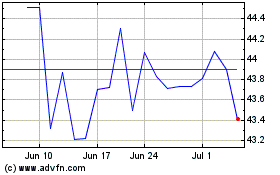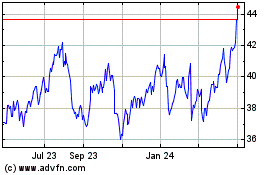HSBC Mulls 'Bad Bank' in Strategic Shake-Up -- Financial News
February 13 2020 - 7:57AM
Dow Jones News
By Paul Clarke and Ryan Weeks
Of Financial News
HSBC Holdings PLC's top executives are considering a radical
overhaul of the bank to address ongoing underperformance in several
of its largest units.
The plans include a potential merger of two of its biggest
divisions, as well as the creation of a "bad bank" to house
billions of dollars of unwanted assets and businesses, according to
people familiar with the management's proposals.
The people stressed that final decisions have yet to be taken
and the structure of the overhaul could change. A spokesperson for
HSBC declined to comment on the plans.
The bank has signaled that it will reveal a strategic overhaul
on Feb. 18 when it reports full-year results. Analysts and
investors have been waiting for details of the plan since interim
chief executive Noel Quinn promised to "remodel" the bank in
October.
Two people familiar with management's plans told Financial News
that HSBC is likely to unveil a new unit that will house both its
global banking functions and certain parts of its much larger
commercial banking business.
Greg Guyett, who was recently promoted to lead the global
banking and markets business, is the frontrunner to take charge of
the new unit, the people said. Mary MacLeod, who joined the bank as
chief operating officer of global banking from McKinsey last year,
could become COO of the combined group, they added.
HSBC is also considering the creation of a bad bank to house
$150 billion-$250 billion in unwanted or underperforming assets and
business lines, according to one person. These could include global
banking and markets assets, as well its French retail unit and
Turkish operations.
Its global banking and markets business is likely to be a target
for cuts, according to Citigroup analysts, who have described HSBC
as a "poster-child for the challenges of global banks." HSBC could
cut risk-weighted assets in its US investment bank by up to 50% and
by a third in Europe, they added. Together with its plans to
dispose of its French retail bank, this would reduce RWAs by a
total of $83 billion, the Citi analysts said.
HSBC's commercial banking unit posted revenues of around $4
billion in the first six months of 2019, accounting for 33% of
group earnings. Global banking and markets made up 23% of
revenues.
The investment bank has been on a push to win larger deals but
has lagged behind its competitors for years in mergers and
acquisitions advice and equity capital markets underwriting.
Integrating the commercial and investment banking businesses
would be a challenge, according to one senior figure who has
overseen similar transformations at other large institutions.
"For a start there are cultural issues, with investment bankers
and commercial bankers generally butting heads," they said. "Then,
at HSBC, there is the infrastructure... both divisions run on
completely separate platforms. Combining that will be both costly
and challenging."
The creation of a bad bank is a radical prospect, but follows
similar moves at struggling European rivals. In July last year,
Deutsche Bank AG said it was hiving off 288 billion euros ($313.9
billion) in assets and businesses into what it termed a capital
release unit. In mid-2014, Barclays PLC created a "non-core"
division to house around 400 billion pounds ($518.6 billion) in
assets, which it closed in 2017.
The bank's top management has already shaken up the senior ranks
in recent months. Samir Assaf, its long-serving head of global
banking and markets, stepped down in November. Matthew Wallace, its
co-head of corporate finance, left in January. The bank installed
two new co-heads of debt capital markets, Adam Bothamley and Sean
McNelis, in December.
Website: www.fnlondon.com
(END) Dow Jones Newswires
February 13, 2020 07:42 ET (12:42 GMT)
Copyright (c) 2020 Dow Jones & Company, Inc.
HSBC (NYSE:HSBC)
Historical Stock Chart
From Mar 2024 to Apr 2024

HSBC (NYSE:HSBC)
Historical Stock Chart
From Apr 2023 to Apr 2024
